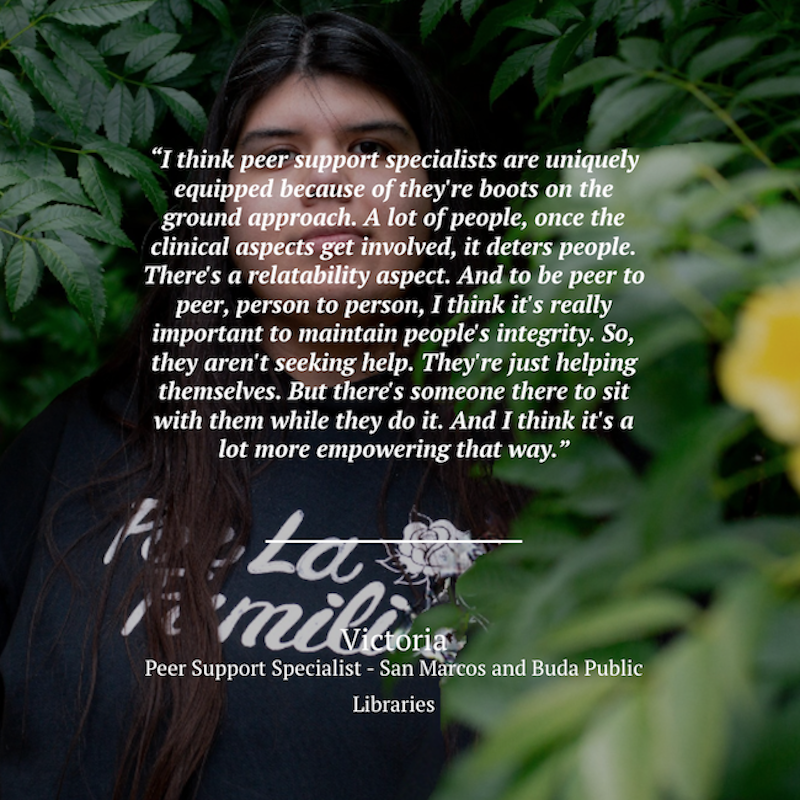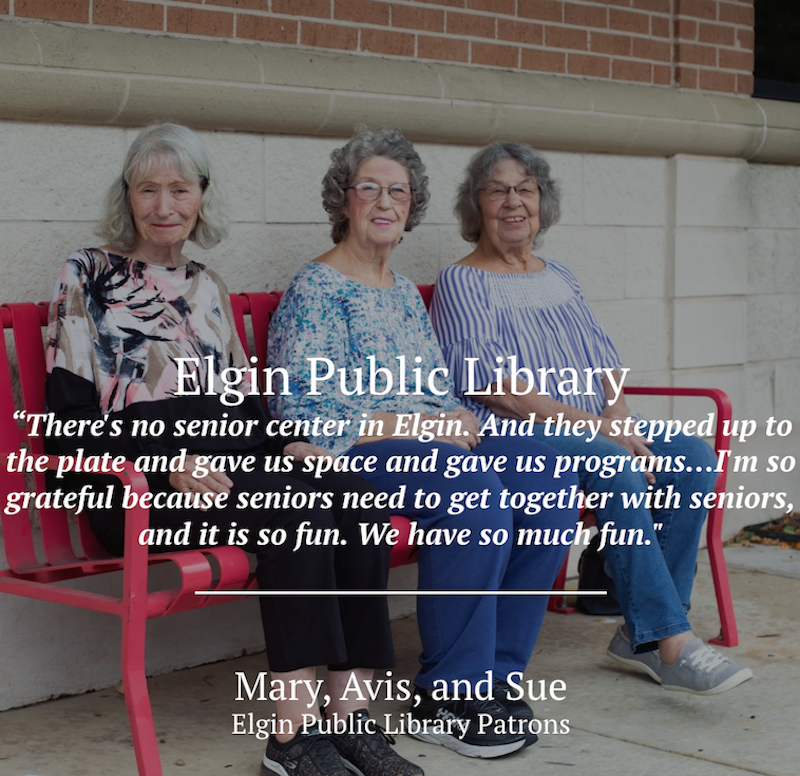Libraries for Health
Supporting Community Networks to Improve Mental Health and Wellness
Via Hope and St. David’s Foundation are pleased to announce the Libraries for Health initiative to address some of the most pressing health needs facing communities: depression, anxiety, and other types of mental health conditions. This initiative recognizes and elevates the opportunity for an anchor institution that is woven into our social infrastructure—a local public library—to purposefully support and tackle mental wellness. Further, it seeks to provide the requisite capacity-building skills and collaborative learning for libraries to be broadly successful in community mental wellness endeavors. Beyond traditional grantmaking, the Libraries for Health initiative will involve identifying new and innovative ways to bring health initiatives where they are needed most – particularly in rural and under-resourced communities.
This peer specialist training program provided initial training for certification and placement for the 250 field hours through the Health Resources and Services Administration (HRSA) grant. The overall goal of the HRSA grant program is to improve health outcomes for people served in primary care, criminal justice, and houseless service settings.
Why Libraries, Why Now?
One of the most pressing health needs facing rural communities is addressing residents’ depression, anxiety, and other types of mental health conditions. The saddest exhibits of the gravity of the situation are the elevated rates of suicide in rural communities. According to the St. David’s Foundation, in 2019 in Texas, 14% of the state’s 3,891 suicides occurred in rural areas, though only accounting for 11% of Texas residents. This translates to a suicide rate of 18.89 per 100,000 residents in rural Texas, compared to 12.77 per 100,000 in metropolitan areas.
One reason rural communities in Texas, and nationwide, struggle to meet their residents’ mental health needs is the known shortage of mental health care providers in these areas. New initiatives are attempting to address this problem by incentivizing providers to practice in rural areas and expanding telehealth options. However, the results from efforts to expand the supply of mental health care providers will be seen in the long-term, and telehealth services are still constrained by a limited number of providers. This shortage of mental health providers is exacerbated by access barriers to care occurring not only in rural but also in suburban and urban communities: lack of reliable transportation, poor digital literacy skills, no or limited internet access or technology, limited mobility, and underlying co-morbidities such as weight gain, poor nutrition, poor sleep, and smoking. These barriers, compounded by COVID-19, have increased stress resulting in reported increases in anxiety and depression symptoms including in central Texas.
Public libraries are core community hubs that offer access to resources for those who may be uniquely at risk for mental health conditions and who may experience the greatest barriers in receiving care. Yet, while the public library sector has general awareness of these challenges and barriers, they have not proactively connected themselves to preventative mental health services or activated their programs and services as early mitigators for patrons’ anxiety and depression. Only a few libraries offer social work services and these are primarily for patrons experiencing homelessness or who are in abusive conditions.
In the news
- Libraries for Health: Reimagining Mental Health Care Delivery in Central Texas, video by Liz Moskowitz (July 2024)
- “For Central Texans, libraries can be a mental health resource,” Public News Service (April 8th, 2024)
- “Texas libraries work to bridge state’s mental health services gap,” Texas Tribune (March 22nd, 2024)
- “Reimagining Justice: Exploring Texas Innovations in Mental Health,” Texas Judicial Commission on Mental Health podcast (March 19th, 2024)
- “Together we heal: Exploring mental health peer support at the library,” WebJunction (February 20th, 2024)
- “Buda Public Library welcomes free mental health support to community,” KXAN (January 26th, 2024)
This photo essay by documentary photographer and filmmaker Liz Moskowitz includes portraits of program participants and interviews with library staff, peer specialists and persons receiving services.


Participant Eligibility
- Libraries for Health seeks to collaborate and learn from each public library, and thus, there is no “perfect” applicant. Instead, there are organizational characteristics that strengthen an applicant’s case for participation. At the most basic level, applicants should be:
- Located in one of the following counties: Bastrop, Caldwell, Hays, Travis and Williamson
- Willing to work to close health equity gaps in their service area’s communities
- Open to being part of a cohort-learning environment and receiving mentoring and coaching
- Willing to set goals to strengthen the library’s contributions to improve adult mental health
- Excited to collaborate with lay mental health workers/community health workers and licensed mental health providers
- Devoted to meaningful engagement of patrons to support their journeys to improved mental wellness
- Motivated to model approaches that address the root causes of barriers to mental health care
- Willing to use public data and patron feedback to drive decision-making and share insights as appropriate
- Open to trying new ways to enhance existing library programs to better support adult patrons’ mental health
- Eager to be part of an effective training, coaching and peer-mentoring process
- Ready to adapt best practices that are relevant to its community’s mental health and wellness
- Has the capacity to fully participate in all aspects of Libraries for Health (including various forms of training during dedicated sessions) and actively apply learnings in between trainings to progress (in partnership with the licensed MHP and lay MHW)
Qualifications
Applicants are required to:
- Have lived experience in mental health and/or substance use
- Attend virtual orientation
- Commit to attending all trainings
- Complete 250 field hours over 6 months
Current Partner Site locations
Field hours take place in one of the following locations:
- Elgin
- Del Valle (Garfield and Elroy)
- Smithville
- Del Valle (Elroy and Garfield)
- Jarrell
- San Marcos
- Taylor
- Martindale
- Buda
Introductions
Via Hope HRSA Staff:
- Dr. Sandra Smith, Program Director
- Christina Carney, Program Coordinator
- Ta’Kisha Moore, L4H Coordinator
Questions?
- Check out the Via Hope Peer Specialist Training Program FAQ here
- Contact christina.carney@viahope.org
- Check out this fact sheet for librarians by St. David’s Foundation and RAND.